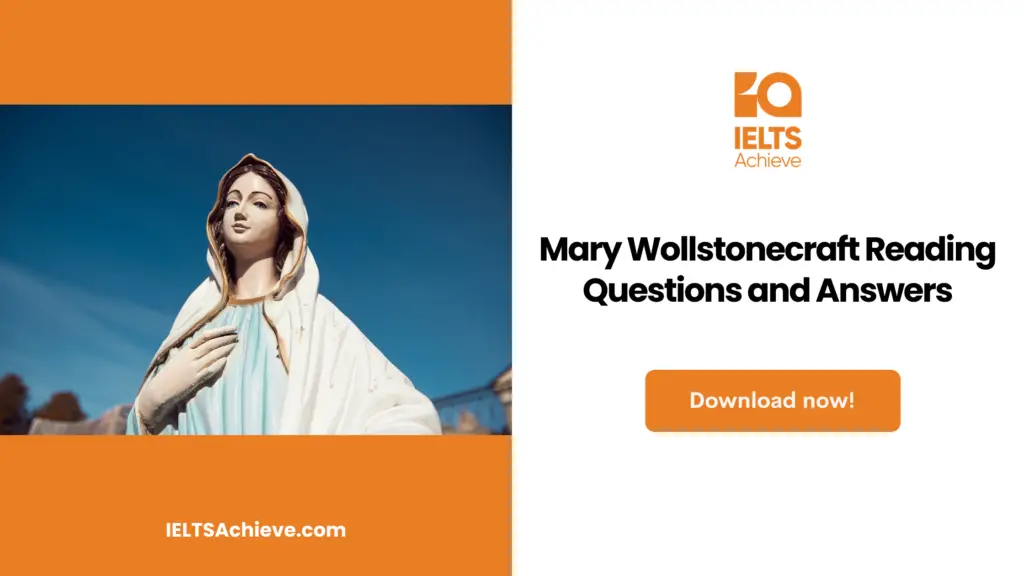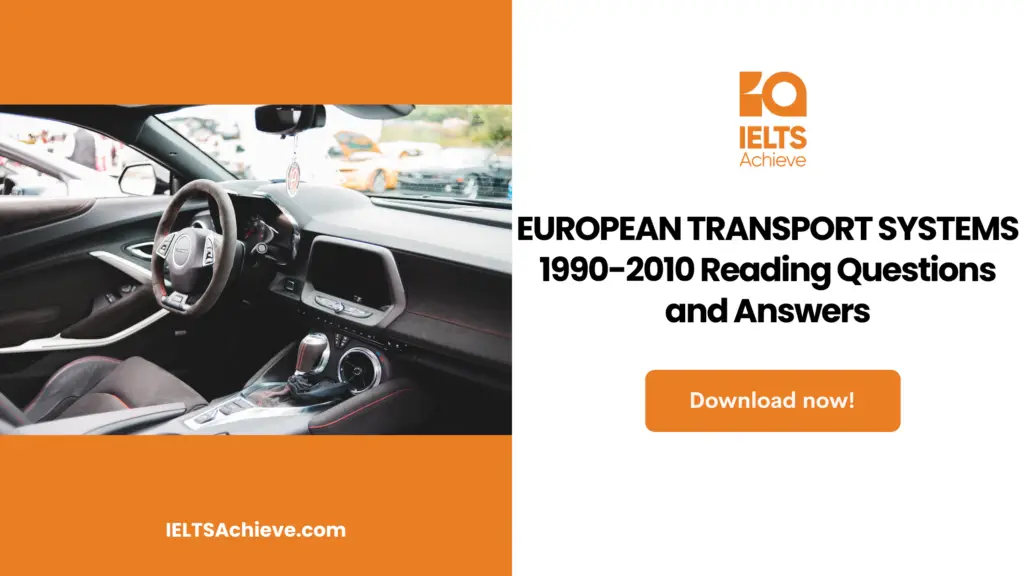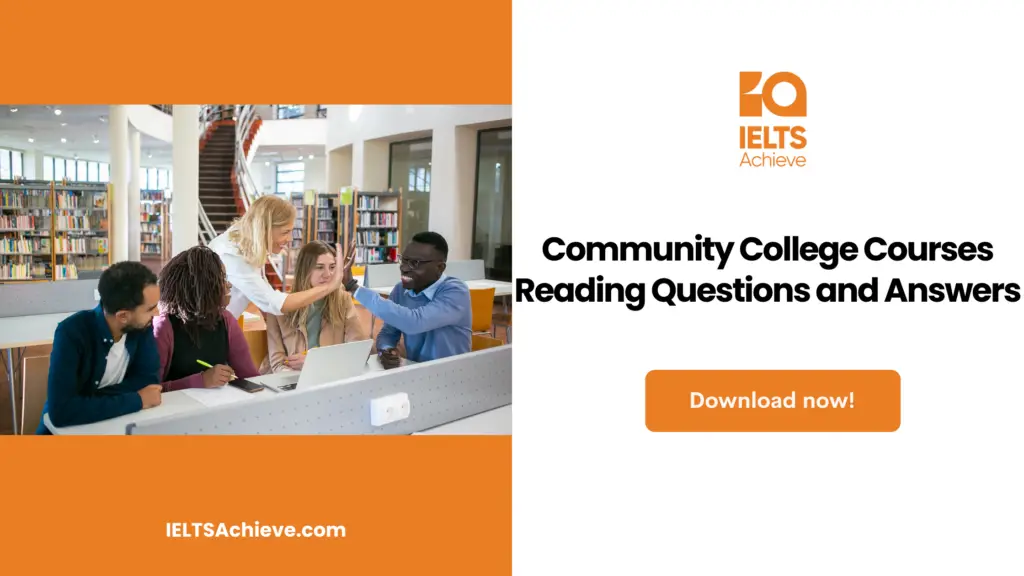The Blog post contains the following IELTS Reading Questions:
- IELTS Reading Multiple Choice Questions
- IELTS Reading Matching Headings
Stay informed and prepared for success – Explore our comprehensive Reading Test Info page to get valuable insights, exam format details, and expert tips for mastering the IELTS Reading section.
IELTS Reading Passage – Mary Wollstonecraft

Mary Wollstonecraft
A In 1789 began the celebrated French Revolution, an event which shook the old certainties of European states and European monarchies to the core. It also raised debate on the desired structure of the state throughout whole populations to an unprecedented degree. In October the following year, Edmund Burke brought out his Reflections on the Revolution in France which sold 35,000 copies within weeks, then a huge number. It reinforced all the fears and prejudices of the traditional aristocracy. Immediately, more progressive authors began writing their responses including the celebrated Thomas Paine whose ‘The Rights of Man’ sold an amazing two million copies.
B But Paine’s was not the first response. Less than a month after Burke’s book was published there appeared the anonymous A Vindication of the Rights of Men. It sold so well that a second edition appeared only three weeks after the first. However, in this edition the author was named as Mary Wollstonecraft. The involvement of women in politics was almost unknown at the time and there was outrage. Horace Walpole called her “a hyena in petticoats”.
C If she was intimidated by the outcry, it did not show. Only two years later, at the beginning of 1792, she produced another book with an even more inflammatory title: A Vindication of the Rights of Women. This has been a handbook for feminists ever since. Women tended to like her strong opinions while men were, not surprisingly, infuriated. What is surprising is that so many of the men who attacked this piece are usually thought of as politically advanced. Even William Godwin, for example, supported the idea that men and women were different and complementary and this required a political arrangement where men led and women followed. Wollstonecraft attacked this notion and demanded independence and equality for women.
D This rebellious streak led her in quite a different direction from most of her contemporaries. As bloodshed in Paris reached its peak during 1792 and 1793, and most British fled from France, Wollstonecraft moved to Paris to live. She stayed while most of her French friends were killed. Quite why is not clear since she clearly preferred the society of the bourgeois intellectuals who were dying to the street revolutionaries who were killing them. Perhaps it was only after this experience that she appreciated some of the practical pitfalls of unchecked liberty.
E The reality of revolution seemed to change her in a number of other ways. A feature of her Vindication was to urge both men and women to subjugate passion to reason. Before her experience in France she had remained single and, single-mindedly, celibate despite the temptation offered by the painter Fuseli. But whilst in France she threw herself into a passionate affair with the American adventurer Gilbert Imlay. She even followed Imlay to Scandinavia in search of stolen silver treasure; a triumph of passion over reason if ever there was one! How ironic that she should suffer this fate in the middle of, what she hoped would be, the foundation of a better, more rational, society.
F She never entirely lost her principles, however, and clung to the belief that a better world based on equality and reason was attainable. Eventually she returned to Britain and, after a failed suicide bid, she married the very William Godwin who had so criticised her before. She died in childbirth not long after and pronounced herself “content to be wretched” but refused to be a nothing and discounted.
G Mary Wollstonecraft’s life was revolutionary in many ways, even for her time. She may have been inconsistent and contradictory but this cannot diminish the effect she had on the political thoughts of her contemporaries. We cannot ignore too, the degree to which she has influenced later thought, even down to the present day. Her son-in-law, Percy Shelley, was a fervent admirer who immortalised her in verse in The Revolt of Islam. De Beauvoir’s The Second Sex and Greer’s The Female Eunuch both owe their origins to Wollstonecraft’s pioneering writing. The notions of equality we take for granted today first appeared in her work.
Unlock your full potential in the IELTS Reading section – Visit our IELTS Reading Practice Question Answer page now!
Recommended Questions:
Renewable Energy IELTS Reading Question with Answer
Questions 28-33
Reading Passage 3 has seven paragraphs A – C. Choose the most suitable headings for paragraphs A – G from the list of headings below.
Paragraph headings
i A tragic ending
ii A revolutionary life
iii Being different
iv Contradictory behavior
v The work of Thomas Paine
vi Reactions to revolution
vii A life in perspective
viii The first reaction to Burke
ix Asserting the rights of women
Example: Paragraph A
Answer vi
28 Paragraph B
29 Paragraph C
30 Paragraph D
31 Paragraph E
32 Paragraph F
33 Paragraph G
Ready to conquer Matching Headings questions? Click here to learn essential tips and techniques for matching headings accurately to paragraphs or sections in the IELTS Reading section.
Questions 34-40
Choose the appropriate answers A – D and write them in boxes 34 – 40 on your answer sheet.
34 The revolution in France
A frightened everybody
B prejudiced the aristocracy
C concerned everybody
D challenged the established order
35 Wollstonecraft’s A Vindication of the Rights of Men
A was an immediate best seller
B sold only slowly at first
C hardly sold at all
D was only read by women
36 The response to A Vindication of the Rights of Men
A intimidated Mary
B made Mary flee to France
C attracted William Godwin
D made Mary write another book.
37 Men objected to the book because
A it was written by a woman
B it challenged established ideas about men and women
C she published before them
D the writer was a female politician
38 Mary’s personal life
A always matched her published beliefs
B sometimes contradicted her published beliefs
C never contradicted her published beliefs
D never matched her published beliefs.
39 In refusing to be discounted she meant
A women should be taught literacy and numeracy
B the role of women should not be reduced
C she was not to be overlooked for being a woman
D she was happy as she was
40 Mary Wollstonecraft’s writing
A was constant and contemporary
B inspired modern feminist writers
C took equality for granted
D was ignored
Ready to improve your performance in Multiple Choice Questions (MCQs)? Click here to access our comprehensive guide on how to tackle MCQs effectively in the IELTS Reading section.
Unlock your full potential in the IELTS Reading section – Visit our IELTS Reading Practice Question Answer page now!
Recommended Questions:
Renewable Energy IELTS Reading Question with Answer

We hope you found this post useful in helping you to study for the IELTS Test. If you have any questions please let us know in the comments below or on the Facebook page.
The best way to keep up to date with posts like this is to like us on Facebook, then follow us on Instagram and Pinterest. If you need help preparing for the IELTS Test, join the IELTS Achieve Academy and see how we can assist you to achieve your desired band score. We offer an essay correction service, mock exams and online courses.

